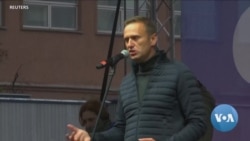Russian opposition leader Alexey Navalny is in serious condition at a Siberian hospital after falling ill from what his press spokeswoman said appeared to be deliberate poisoning.
Navalny, 44, is in a medical facility in Omsk where doctors have induced a coma and connected him to a respirator.
He was aboard a flight heading home to Moscow when he fell ill, forcing an emergency landing. A passenger posted a video to Telegram in which cries could be heard from inside the airplane’s lavatory stall.
Navalny’s spokeswoman, Kira Yarmysh, said in a tweet that the opposition leader had some black tea before complaining he felt poorly during the flight.
“It was the only thing that he drank in the morning. Doctors say the toxin was absorbed faster through the hot liquid,” said Yarmysh in a post to social media.
A passenger, Pavel Lebedev, posted a photo from an airport cafe prior to the flight that showed Navalny in a cafe drinking what appeared to be a cup of tea. S7, the airline whose plane Navalny boarded, said he had not been served food or drink.
Speaking to reporters, the deputy head doctor of Hospital No. 1 in Omsk, Anatoly Kalinichenko, suggested Navalny’s condition had stabilized somewhat but remained serious.
“His active treatment is ongoing,” Kalinichenko said. “Doctors aren’t simply doing everything possible. Doctors are truly working to save his life.”
Navalny’s wife, Yulia Navalnaya, arrived at the hospital Thursday afternoon but initially was prevented from visiting Navalny on the ground that the patient hadn’t given consent to the visit.
Navalny’s personal doctor, Anastasia Vasilyeva, accompanied Yulia Navalnaya but was denied access to her patient.
Pictures and video from the scene showed scores of police at the hospital, presumably to carry out an investigation.
Ivan Zhdanov, a Navalny associate, reported to the media that the hospital had for now ruled out the opposition politician’s transportation to Moscow.
Supporters of the opposition leader held picket vigils in protest in several cities across the country.
When asked about Navalny at a daily briefing Thursday, Stephane Dujarric, spokesman for the U.N. secretary-general, said, "We are following with concern the reports that Mr. Navalny has a sudden illness. We obviously wish him a speedy recovery. Any allegations of suspected poisoning, if confirmed, should be fully investigated."
Anti-corruption work
Navalny has long been a problematic figure for the Kremlin — detailing corruption and excess at the highest levels of the government on his popular YouTube channel.
The channel’s mix of investigative journalism and caustic humor has resonated with younger Russians in particular.
Navalny has also made no secret of his political ambitions. He tried to run a campaign for president in 2018 that ultimately was undone by a lingering criminal conviction. His supporters — and the European Court of Human Rights — agreed that the charges were levied to keep him out of the race.
Associates from the Navalny-founded Anti-Corruption Foundation, known by its Russian initialism FBK, also were prevented from participating in local elections in Moscow in 2020 — a ban that prompted a wave of street protests last summer in the capital.
Despite not being on the ballot, FBK members promoted what is described as a smart voting strategy that resulted in the defeat of dozens of Kremlin-backed candidates.
The foundation was raided by police and hit with money-laundering charges shortly thereafter.
In June, Navalny announced he was dissolving the foundation amid a slew of court-ordered fines and penalties handed down by judges loyal to the state.
The group had been planning to widen the smart voting strategy to regional elections scheduled for September 13.
Poisoning trends
Under President Vladimir Putin’s rule, Russia has had a grim history of government opponents being attacked, poisoned or worse.
In 2015, Navalny ally Boris Nemtsov was shot and killed on a bridge just outside the Kremlin walls. Vladimir Kara-Murza, an aide to Nemtsov, barely survived a poisoning attack a few months later. There are several other notable instances of Putin adversaries having been killed.
This isn’t the first time Navalny has been targeted. He suffered a serious burn to his eye after provocateurs doused him with antiseptic dye in 2017.
He also fell ill while serving a monthlong prison sentence in July 2019. Doctors suspected he might have had contact with “some toxic agent” that led to “contact dermatitis.” None of his cellmates had similar symptoms.
Navalny’s suspected poisoning Thursday instantly prompted debate over whether his political enemies — and the Kremlin in particular — would have anything to gain from a brazen attack that many would blame on Putin.
“Even if [the] Kremlin doesn’t know anything about it, it’s quite strange because it means these kinds of events are uncontrollable,” said Andrei Kolesnikov of the Moscow Carnegie Center in an interview with VOA.
Kremlin denial
The Kremlin repeatedly has denied involvement in past attacks against opposition figures, arguing they’re provocations.
Kremlin spokesman Dmitry Peskov said the government was monitoring news of Navalny’s condition through the press and “wished him a speedy recovery, as they would any citizen of the country.”
Peskov also said that he saw no reason to inform Putin about the incident, but that the government would launch a criminal investigation if a toxicology report found the poisoning allegations true.
Meanwhile, some political observers focused on the circumstances of the incident and wondered what they meant for Navalny’s chances of recovery.
Anton Orekh, a columnist with radio station Echo of Moscow, noted in a comment to social media that if Navalny had indeed been poisoned before his flight, it was intended to do maximum damage.
Once in the air, noted Orekh, “quick medical help is all but impossible.”
VOA U.N. Correspondent Margaret Besheer contributed to this report.










